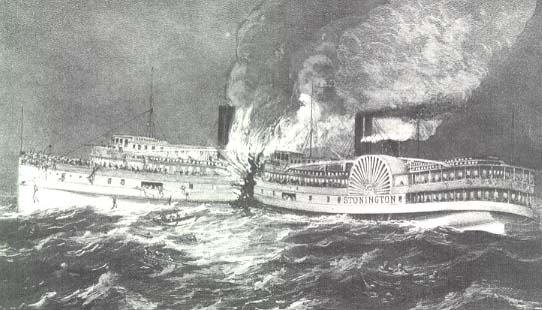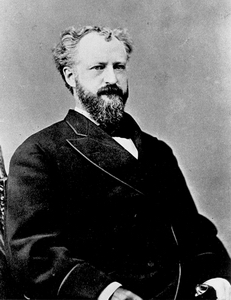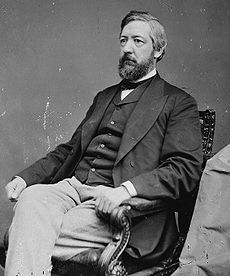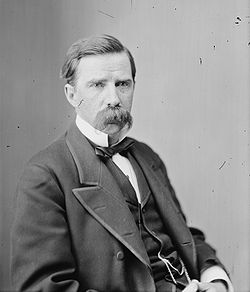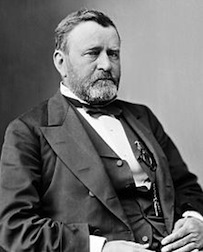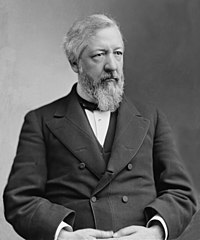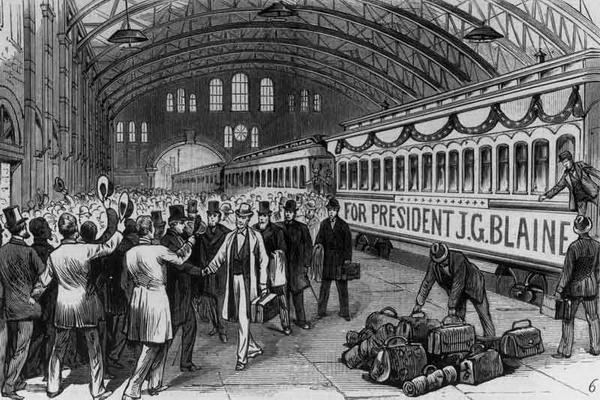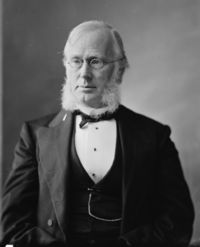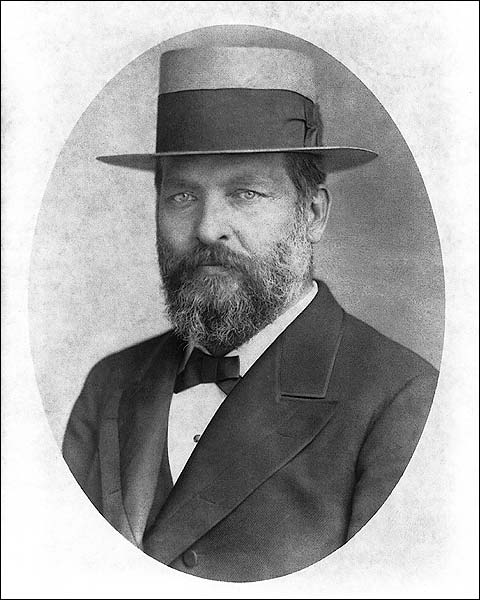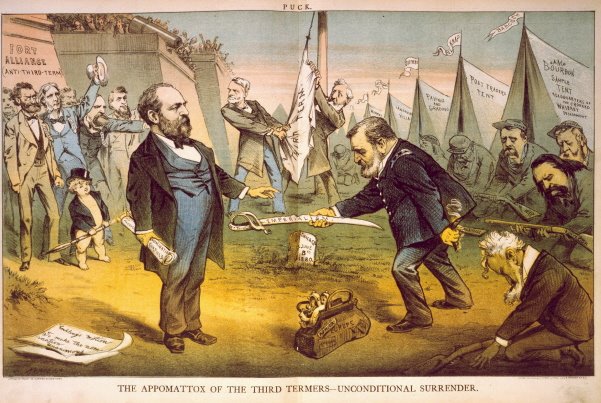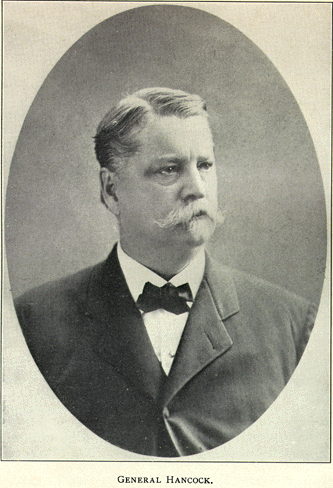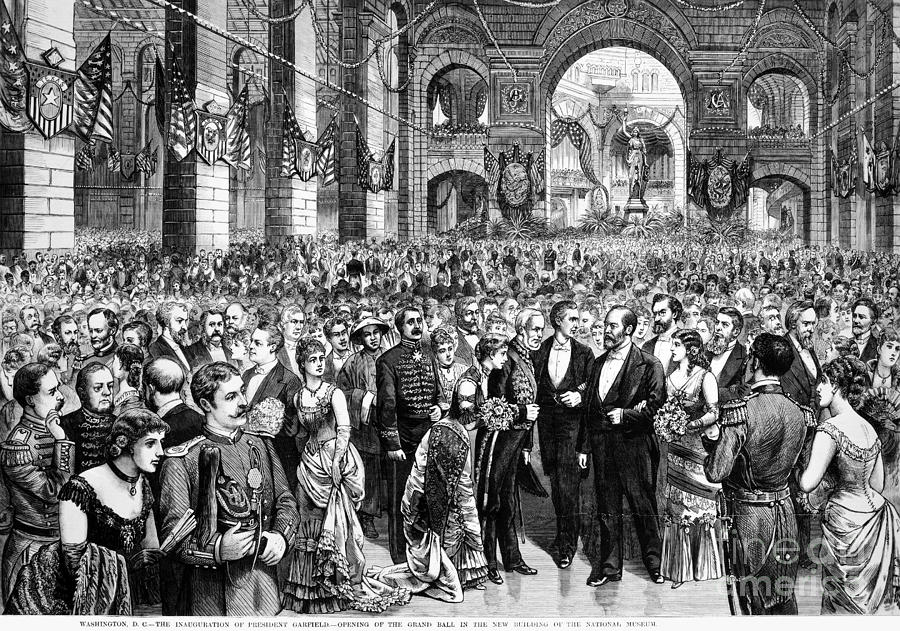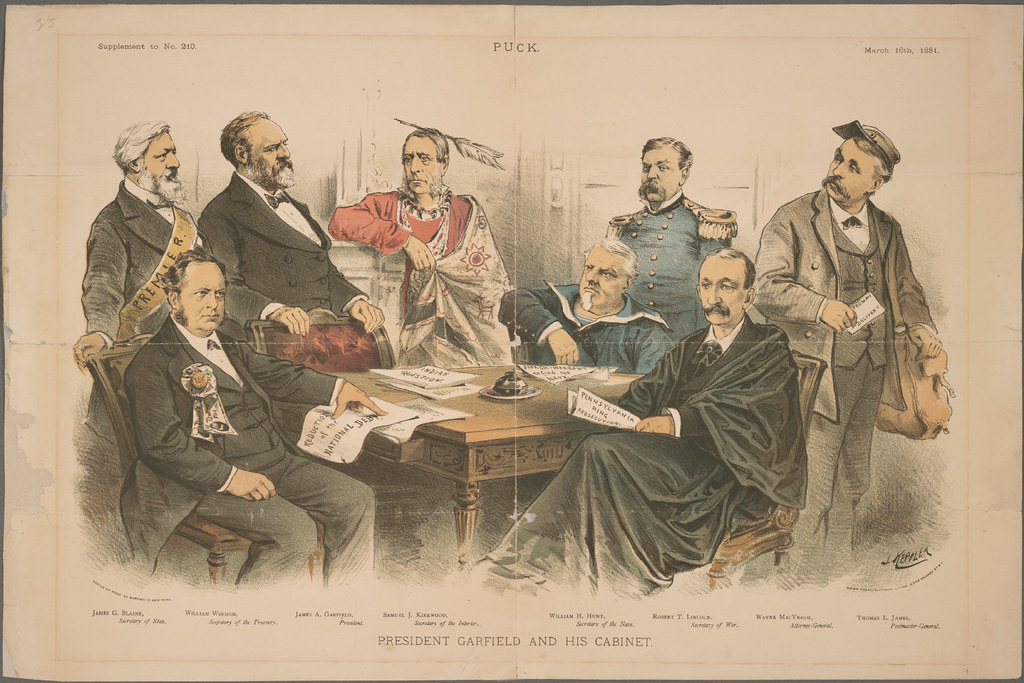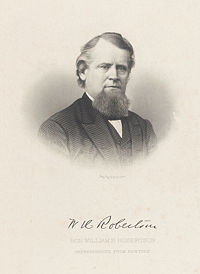[FONT=Times New Roman, serif]- Chapter Two -[/FONT]
“[FONT=Times New Roman, serif]
The President is the last person in the world to know what the people really want and think.” [/FONT]
[FONT=Times New Roman, serif]- James Abram Garfield [/FONT]
[FONT=Times New Roman, serif]
Inauguration and Consternation[/FONT]
[FONT=Times New Roman, serif]or[/FONT]
“[FONT=Times New Roman, serif]NO TRADES, NO SHACKLES”[/FONT]
[FONT=Times New Roman, serif]
The campaign itself had been a rather quiet affair for Garfield. After the shock of the election of him for the parties candidate had worn off and he had accepted it with better feelings, he had returned to Lawnfield, his Mentor, Ohio home where he spent most of his time during the campaign itself. The party, in an effort to find a candidate to keep the Stalwarts happy had in the Vice-President voting ballot, chosen Chester A. Arthur as that across the aisle placating candidate. From his farm and homestead in Mentor, Garfield had spent most of the time with a front porch campaign, working the land while answering questions and generally letting the rest of the party deal with the actual national campaign. [/FONT]
[FONT=Times New Roman, serif]
Lawnfield, the estate of James A. Garfield and family. [/FONT]
[FONT=Times New Roman, serif]
Garfield himself did make one important trip, traveling to New York to deal with the fractious nature of the party that could possibly have derailed the campaign if left to its own devices, along the way making a few railcar speeches and visits at the various stops along the way. Sitting down with the two main factions who still smarted to a degree over the end result of the June convention, Garfield managed to in what he considered a personal success, get them to resolve enough of their issues so that the campaign could continue with internal peace. However, Conkling who had been seen checking into the same hotel as the various representatives of the parties ideological factions, had not been seen at all, though rumors abounded he was merely using his own cronies to report on and work at the conference while not attending as a slight to those their. Returning home to Ohio much as he had left it, it was up to the party following the New York Conference to win the election without Garfield appearing much. However, despite the brief term of peace during the election, the simmering animosity in the opposing factions of the Republican Party would still continue. [/FONT]
[FONT=Times New Roman, serif]
Across the months between the end of the convention and election day, the Republicans began to promote the hard working, self-made man image of Garfield, a success story for the modern American to latch onto. The Democrats had chosen a war-hero of their own to run, Winfield Scott Hancock of Pennsylvania. Deciding that it would be unwise to attack Hancock directly considering his services at Gettysburg gave him good reputation to the public, the Republicans had gone on the attack with aspersions that despite being a good man, Hancock would not be able to govern wisely or effectively, being possibly hindered by Democrats in Congress and his administration if elected. Throughout the summer and early falls months the campaign was reliant on the party rather than its candidate. [/FONT]
[FONT=Times New Roman, serif]Winfield Scott Hancock[/FONT]
[FONT=Times New Roman, serif]Democratic Presidential Candidate [/FONT]
[FONT=Times New Roman, serif]
The Democrats retaliated by pointing out the corruption in the Republican party and especially in the choice of running-mate for Garfield, in the choice of Arthur. As well, the problems of Chinese Immigration were one of the most important and widely debated topics that the election hinged on. Westerners were against further immigration, while Easterners were generally less concerned and sometimes even supportive of further immigration. A likely forgery printed by Democrats in the even of the election, purported to show that Garfield supported or at least was amenable to further opening Chiense immigration to the west and the U.S. Its timing and rather poor construction in some parts convinced few that it was real. [/FONT]
[FONT=Times New Roman, serif]
Among the largest supporters of the Garfield candidacy were African freedman, both pre and post-war freedmen, who saw in the candidate the best chance for real reform in terms of ensuring the liberty so recently won, would not be tarnished and lost by the growing number of states that were enacting more and more laws that made it harder for freedmen to vote or live as equal citizens. During an October convention a few days before the election, Frederick Douglass gave a speech to an assemblage of black and white voters about who he was supporting. [/FONT]
“[FONT=Times New Roman, serif]
James A. Garfield must be our President. I known [Garfield], colored man; he is right on our questions, take my word for it. He is a typical American all over. He has shown us how man in the humblest circumstances can grapple with man, rise, and win. He has come from obscurity to fame, and we'll make him more famous.” Douglass finished his speech with the line “He has buffeted the billows of adversity, and to-night he swims in safety where Hancock, in despair, is going down.”[/FONT]
[FONT=Times New Roman, serif]Frederick Douglass[/FONT]
[FONT=Times New Roman, serif]
Garfield, while spending most of his time at his Mentor, Ohio homestead, did make several speeches with those reporters and voters who came to the Lawnfield estate where he and his family lived. Indeed, Garfield was the first American candidate for President to give a speech in a language other than English, that speech being to a gathering of German immigrants in their own language. Known as front porch talks in general, his oratory skill did not diminish even in the time away from office, and his passion for speaking even less so. His private secretary, Joseph Brown, who had also become almost a member of the family as well and a close friend of Garfield's, wrote that perhaps the most emotional moment of these talks came when singers from an all-black university near Nashville came and sang for the candidate and his family. When they were finished, and the crowd nearby brimming with emotion, Garfield came forward to speak to them and the crowd as a whole. [/FONT]
“[FONT=Times New Roman, serif]
And I tell you now, in the closing days of this campaign, I would rather be with you and defeated, than be against you and victorious.” [/FONT]
[FONT=Times New Roman, serif]
As the months to election day grew less and less and the coming day dawned, estimations, guesses, bets, and everything else under the sun about the results became more common. With the last effects of the Panic of 1873 starting to fade, many looked favorably upon Garfield, even if Arthur was a contentious running mate for some. [/FONT]
[FONT=Times New Roman, serif]
On election day, the nation was in a frenzy as the polling began and ended that day. Garfield himself walked into Mentor from his Lawnfield home to cast his vote in the election, and aside from that and a brief stop occasionally at the town telegraph office to observe the few results, he spent most of his time keeping to his usual routine, spending time with neighbors while working on his farm and making notes about improvements or needed supplies for future agricultural experiments. After finishing the days chores and conversations, Garfield retired, not knowing much of the results to come.[/FONT]
[FONT=Times New Roman, serif]
Across the country, as the results were counted, the election was close, and constantly changing predictions were held, some claiming it would be Hancock and others Garfield hours before the final tally. As the election results were transmitted across the nation by telegraph, the contest between the two men became closer and closer. Finally, at the end by the narrowest of margins on the popular vote but with a 59 electoral vote lead over Hancock and 29 more over the amount needed for the electoral college to clinch it in his favor, the election was called in favor of Garfield. Garfield and Arthur were respectively the President and Vice-President Elect. [/FONT]
[FONT=Times New Roman, serif]
When notified the next morning after election day, Garfield seemed to be the most cool and calm-headed man in the group of supporters and reporters surrounding his home. He himself noted little of the event in his diary entry for the day, giving it the simple entry of “The news of 3 A.M. is fully justified by the morning papers.” However, he himself had a growing unease with the results, as the full implications took told of what had transpired and what would transpire. While many political men desired the presidency above all-else, Garfield saw it as an almost complete upheaval of his families way of life. Come next March, the Garfield's would find Washington D.C. as their home instead of Lawnfield for the next four years, as well as deal with the daunting life of President and First Family. In a letter to a friend, he attempted to state the loss that seemed to permeate his feelings since hearing the news of his victory.[/FONT]
“[FONT=Times New Roman, serif]
There is a tone of sadness running through this triumph, which I can hardly explain.”[/FONT]
[FONT=Times New Roman, serif]
Excerpt from “Farmer Garfield: The Life and Times of America's 20th President.” by Rich Morris, Walter-Kincaide Publishing, Boston. ©1991 [/FONT]
[FONT=Times New Roman, serif]
Garfield generally found it hard to carry a long-term grudge, even describing himself as “a poor hater”, he nonetheless disliked having to share the executive office with a Republican whose alliances and loyalties were closer to Conkling than the party proper. Indeed, Arthur would be involved in several of the power plays of the early months of the Garfield administration involving the Congressional approval of candidates for the cabinet posts. Within weeks before and after the inauguration, Garfield had lost at least three candidates for cabinet posts to the machinations of Conkling, who had made it clear through an earlier message to Garfield about his intentions in the matters of the party and the president. [/FONT]
“[FONT=Times New Roman, serif]
I need hardly add that your administration cannot be more successful than I wish it to be. Nor can it be more satisfactory to you, to the country, and to the party than I will labor it to be.”[/FONT]
[FONT=Times New Roman, serif]
The New York senator was not a man who liked having his way ignored, disrespected, or barred. Conkling felt that Garfield was a oath-breaker and liar, having said one thing in his opinion, and then doing something else. When Garfield refused to give Levi Morton a position in his cabinet above either War or Navy, the senator had braved a long trip in the midst of winter to visit Garfield's home in Ohio to convince him of putting Morton in the treasury, his opinion worsened. Already upset at this turn of events, the fact that Garfield had offered instead Judge Charles Folger as a potential replacement as treasury, and had been warned against that idea, and then still offered the judge a position in the Justice Department, though declined, angered him more. However, it was the fact that Morton would go behind his back to take Garfield up on his offer of Secretary of the Navy that would anger him more and cause him to begin his plot to revenge himself upon the president-elect. [/FONT]
[FONT=Times New Roman, serif]
In the weeks before the inauguration, Garfield had put together a list of potential candidates for cabinet posts. Written in one of his personal notebooks, he had written: [/FONT]
- [FONT=Times New Roman, serif]For State: Senator James G. Blaine (Maine)[/FONT]
- [FONT=Times New Roman, serif]Treasury: William Windom (Minnesota) [/FONT]
- [FONT=Times New Roman, serif]Interior: Senator Samuel J. Kirkwood or William Allison (both Iowa)[/FONT]
- [FONT=Times New Roman, serif]War: Robert Todd Lincoln (Illinois) [/FONT]
- [FONT=Times New Roman, serif]Navy: Levi P. Morton (New York) [/FONT]
- [FONT=Times New Roman, serif]Attorney General: Wayne McVeagh (Pennsylvania)[/FONT]
- [FONT=Times New Roman, serif]Post Office: William H. Hunt or Don Pardee (both Louisiana) [/FONT]
[FONT=Times New Roman, serif]
Garfield still held that logical choice would triumph in the end over emotional politicking. Morton was a Stalwart, Blaine a Half-Breed, and the others representatives of the various states that had supported his bid the most as well as geographical diversity. However, his plans did not last long after his arrival in Washington D.C. in the days before the inauguration. Contacting Levi Morton in secret prior to his arrival, he had given him the offer to join the cabinet as Navy Secretary. Agreeable to being a member, Morton had stated his agreement, and promised to keep it quiet and hidden from his “boss” Conkling. Yet, a man such as Conkling knew how to find information, and the same Tuesday night that Garfield had arrived in Washington, the senator from New York desired a word with Morton. Dragged out of his bed, and asked to accompany one of Conkling's cronies across the street to the hotel where Conkling shared rooms with Vice President-elect Arthur.[/FONT]
[FONT=Times New Roman, serif]
Levi P. Morton[/FONT]
[FONT=Times New Roman, serif]Upset and in a rage, Conkling berated Morton with the Vice President-elect inside the apartments known to some of the political bosses friends as “the morgue”, calling him “ruinous to the Republican party of New York.” After hours of being berated, shamed, insulted, and orated at by Conkling, Morton gave up. A quick change of clothes and a cup of coffee barely bolstered him as he dragged himself across the city to Riggs House where Garfield was staying to state he was declining the nomination for Secretary of the Navy after all. Noting the incident in his journal, Garfield accepted the declined nomination, but still desired that despite Conkling and his meddling, he would have a Stalwart in the cabinet. With recent news that William Allison as well was declining his nomination for the cabinet as well, he would now need to figure out how to work this as well. Allison suggested perhaps fellow Iowa Senator Kirkwood, the other choice for Interior Department, that was rectified. But what Stalwart would he have in his cabinet now Morton was gone?[/FONT]
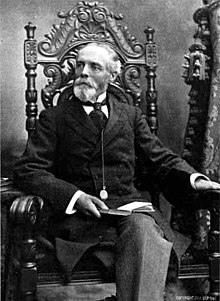
[FONT=Times New Roman, serif]
Whitelaw Reid [/FONT]
[FONT=Times New Roman, serif]
In a meeting with Blaine and Whitelaw Reid, Blaine mentioned the possibility of having New York's Postmaster, Thomas L. James be the candidate. Though loyal to Conkling, he was considered to be fairly honest and competent at his job enough that he would be acceptable for nomination. Deciding together that secrecy was paramount, later that night Reid sent a cable to Thomas James in New York calling for him to take an overnight express to Washington and to do it in secret. The following Thursday morning, Reid found Thomas James knocking at his door in enthusiasm and delight, eager to be a part of the presidents cabinet. After fervent meetings with Blaine and Garfield in secret, and his swearing that his duty and loyalty lay to the executive office, and not the office of a certain New York senator, Reid shipped Thomas James off somewhere to be hidden, where no Conkling crony or the man himself would find him in time. [/FONT]
[FONT=Times New Roman, serif]
After several hours wait, Reid consulted with Tom Platt, the other Senator from New York about the nomination. Having recently sworn to be a Garfield man, Platt was asked that the nomination was fully agreeable to him and that Conkling had nothing whatsoever to do with it. In front of both Reid, and later Garfield, he agreed this was true. Later, when notified by this development by Platt, Conkling went into a rage, and in his fury decided to level his anger and complaints against Garfield. Traveling through a snowstorm that blanketed the city of Washington the eve before the inauguration day to Riggs House, where the President-elect was attempting to write his inauguration speech after several failed attempts, Conkling, Arthur and Platt appeared in Garfield's room whereupon the angered senator launched into a long tirade, against Garfield for “cheating” him by not consulting him. He disliked Reid poking his nose in and helping keep himself in the dark while Garfield worked behind the scenes with the nominations. Garfield did not have a chance to say anything, nor did he when the tirade ended. At this point, he was tired of all this and chose to spend his energies where he felt they were needed, for his coming duties as President. [/FONT]
[FONT=Times New Roman, serif]
Excerpt from “James A. Garfield : A Biography” by Prof. Ellen MacWell, Yale University Printing, ©1987[/FONT]
[FONT=Times New Roman, serif]James A. Garfield taking the Oath of Office [/FONT]
[FONT=Times New Roman, serif]
The cold morning air of March 4[/FONT][FONT=Times New Roman, serif]
th[/FONT][FONT=Times New Roman, serif]
, 1881 would drive many of those who might have attended the inauguration of James Abram Garfield as the 20[/FONT][FONT=Times New Roman, serif]
th[/FONT][FONT=Times New Roman, serif]
President of the United States into their homes or warmer locations. Frost and snow were still on the ground, but not enough to keep the event from too much delay and bother. However, the frostiness in the air was nothing compared to the frostiness between the President-Elect Garfield and Vice-President Elect Arthur. Not having been on overly cordial and agreeable terms following the period between the Republican National Convention and Election Day, and then in the months between that date and Inauguration Day, the relationship between the two men as colleagues and soon to be head-officers in the Executive Branch, had grown worse. Especially since a speech given by Arthur concerning the possibility that votes won in Indiana had been gained through possible illegal voting. [/FONT]
[FONT=Times New Roman, serif]
Garfield had not at all been pleased with the speech, and especially not since it had come on the heels of Arthur suggesting various Stalwart candidates to fill up important cabinet and governmental posts for when the time came to reorganize and reshuffle from the appointments of the previous Hayes administration. As 7,000 or so people brave enough to endure the early morning cold of Inauguration Day came to watch the proceedings on the Capitol Grounds, both men remained distant and cold to the other, generally keeping to their own circle of aides and friends for most of the main ceremony as Chief Justice Morrison Waite administered the oath of office to both men and were officially sworn in as the new President and Vice-President of the United States. For the rest of the days celebrations, both men would be subdued in their interactions with the other. [/FONT]
[FONT=Times New Roman, serif]
Preceding the swearing in, Garfield stepped forward to give his inaugural address to the assembled crowd before him. Having finished the speech that morning after several failed attempts earlier, the new President spoke at length about the issues which he felt were most important to him and the nation, such as education, agricultural and economic problems facing farmers, and the national debt. Roscoe Conkling, who was seated behind the President on the stand, was seen to grin a little at Garfield's mention of civil service reform, a battle which Garfield would be determined to win against Conkling and the political machines that plagued the party and the country. Finally, he reached the issue which was amongst his most passionate ones, that of the civil rights of the African freedmen. [/FONT]
“[FONT=Times New Roman, serif]
The emancipated race has already made remarkable progress. With unquestioning devotion to the Union, with a patience and gentleness not born of fear, they have “followed the light as God gave them to see the light...” They deserve the generous encouragements of all good men. So far as my authority can lawfully extend they shall enjoy the full and equal protection of the Constitution and the laws.”[/FONT]
[FONT=Times New Roman, serif]
The first inaugural address was perhaps however, one of his few public speaking failures. Compared to his nomination of Sherman the year before, the inaugural address was considered by both himself and others to be bland, boring, and uninspiring. This was not helped by the fact that Garfield, who had spent most of the previous day and night attempting to write it, was tired, sore-voiced, and lackluster in tone or energy compared to some of his better attempts. Already the weight of his new position as President was weighing upon him in the days before the inauguration, contributing to the rather poor showing of a inaugural address.
[/FONT]
[FONT=Times New Roman, serif]
President Garfield reviews the Inauguration Day Parade and Review from the reviewing stand. [/FONT]
[FONT=Times New Roman, serif]
Following the speech, the swearing in was quickly completed, with Garfield kissing his mother and wife, both in attendance at the ceremony, and shaking hands with the Chief Justice and several hundred guests and well-wishers. After this extended greeting, the presidential party headed with the Hayes back to the White House, where Lucy Hayes hosted a brief luncheon for the new President and First Lady, Rutherford winking at the new First Couple after making a statement of “I am glad to be a freed man.” From the luncheon, the two couples returned to the festivities, reviewing the inauguration day parade that went past the presidential reviewing stand, an event that lasted over two hours and involved over 15,000 marchers, before the main event of the evening was to start. [/FONT]
[FONT=Times New Roman, serif]
President Garfield receives guests at the Inaugural Ball [/FONT]
[FONT=Times New Roman, serif]
Over 6,000 people crowded into the newly built Smithsonian National Museum Building for the inaugural reception and ball. Garfield had asked that the musicians playing at the reception to include pieces of Gilbert and Sullivan amongst the more formal dance music arranged for that evenings entertainment. Figures on some of the food consumed at the reception came to over 1,500 lbs of turkey, 100 gallons of oysters, 15,000 cakes, and 50 hams devoured by guests. As fireworks flared into the nights sky, and dancers and socialites mingled during the celebrations, it seemed to be a brief reprise from the political fighting that had been eating away at the party and the President. Later that night, as they retired to their new home, James and Lucretia slept sounder than they had in weeks, a rare thing for the sometimes insomnia plagued president, which would only grow worse in weeks to come. [/FONT]
[FONT=Times New Roman, serif]
Though his cabinet choices had all been approved and confirmed that Friday in a three hour turn-around once submitted to the Senate, it would not be easy going for them in the coming weeks. The final list after all the previous debate and problems, was the following: [/FONT]
[FONT=Times New Roman, serif]Secretary of State: James G. Blaine [/FONT]
[FONT=Times New Roman, serif]Secretary of the Treasury: William Windom [/FONT]
[FONT=Times New Roman, serif]Secretary of War: Robert Todd Lincoln [/FONT]
[FONT=Times New Roman, serif]Attorney General: Wayne MacVeagh [/FONT]
[FONT=Times New Roman, serif]Postmaster General: Thomas Lemuel James [/FONT]
[FONT=Times New Roman, serif]Secretary of the Navy: William H. Hunt [/FONT]
[FONT=Times New Roman, serif]Secretary of the Interior: Samuel J. Kirkwood [/FONT]
[FONT=Times New Roman, serif]A political cartoon about the political cabinet of President Garfield. [/FONT]
[FONT=Times New Roman, serif]
While the trials of getting candidates for the cabinet were done, other appointments were coming that would test the new administration in new ways. Ways that could spell whether Garfield would be his own man, or see Congress knock him about as they had with previous administrations? [/FONT]
[FONT=Times New Roman, serif]
Excerpt from “Inaugural Daze: The Pomp, Pageantry, and Spectacle of Presidential Inauguration Ceremonies” by Lyle McCormick, Junebug Press, ©2006[/FONT]
[FONT=Times New Roman, serif]
Senatorial courtesy was amongst the unwritten rules of the United States government, and one which would cause no end of headache to Garfield, Conkling, Blaine, and the Congress in the early months of Garfield's first term. The unwritten rule itself was that should an office be vacant in any particular state that the President could appoint someone to, he was obliged to ask the senior senator from that state if said nomination was acceptable. This was usually the case when said senator was from the presidents own party and wished to remove any obnoxious appointments the president from his party might have in mind. [/FONT]
[FONT=Times New Roman, serif]
The dispute that arose in that would define the early months came when President Garfield submitted a known opponent of Conkling's as candidate to be the new Collector of the Port of New York, who effectively oversaw 90% of the countries exports/imports in taxes as head of the New York Port Authority. Of course, room would have to be made with the current one, and Garfield would have to switch others around in something approaching a strange game of political musical chairs. To make room for William H. Robertson as CPNY, the current one, Edwin Merritt would become consul general in London, the current London consul general, ex-General Adam Badeau, a close friend of former-President Grant was to go to Copenhagen. And the current minister to Copenhagen, who happened to be Grant's own brother-in-law Michael Cramer, would go to Switzerland. This game of shuffling around several Stalwarts and friends/relatives of Grants not only infuriated Conkling, but Grant as well, who harbored a grudge against President Garfield for these and other reasons up until his death. [/FONT]
William H. Robertson
The Contested Nominee for CPNY
[FONT=Times New Roman, serif]
However, Conkling believed that the appointments could be mainly the work of his bitter rival, James Blaine. Indeed, the fact that Robertson was a Blaine man, and that the nomination for solicitor general included William Chandler, Blaine's campaign manager back during the convention. Garfield's hand must have been forced, for he had made several words and promises to Conkling that he would consult him on appointments, which he found to be forgotten rather quickly. Seeing the handiwork of his hated foe in a list that would to have been approved by the Secretary of State regarding consular appointments, Conkling was determined that this political fight that Blaine and Garfield had started would be finished and won by himself. He wielded power, and that power he was not keen to lose. [/FONT]
[FONT=Times New Roman, serif]
The reaction to the list of appointments spurned a reaction that caught even Garfield by surprise, who himself was expecting some small reaction. Stalwarts and even some moderate reformers, were lambasting the administration for the appointments and the way it was handling them. Stalwarts agreed with Conkling that a president should keep his nose out of state business and affairs, and that it seemed as though he had broke several promises during the election cycle to stand by the Stalwart leadership, in return for their support. Garfield had planned his New York appointments to placate both sides of the aisle, but neither side was willing to compromise, especially not Conkling who desired power and control above any sort of fair-minded half-half split for both sides. It was all or nothing in his eyes, and the President and Blaine were declaring war on him. [/FONT]
[FONT=Times New Roman, serif]
Robertson himself found the news of his nomination to the CPNY to be greater than he had hoped for as an appointment. Another rival of Conkling's, Robertson had sought unsuccessfully the governorship of New York before, and had over thirty years as a lawyer, judge, congressman and state legislator. Having chaffed under the political control that Roscoe Conkling and his cronies had exerted in the state, the nomination to Collector not only brought him status and a better pay, but a chance, much like Secretary of State did for Blaine, to break the back of Conkling's empire and machine. With Half-Breeds in the state senate desirous of robbing the hated Conkling of his power, thirty of them rushed the senate chambers the day following the announcement and produced a united resolution backing the nomination, before sending it to Washington. Enemies and allies on both sides began to draw the lines in the sand, while the President, seeing a possible defeat, began making plans for a strategic withdrawal. [/FONT]
[FONT=Times New Roman, serif]
Conkling began using his political clout and knowledge almost as soon as the news broke about the appointments. He had good reason to keep Robertson out, and he knew that unlike others, the man would find ways of using the CPNY posting to break Conkling and his New York machine in his own desire for political power. Of course, he knew that the place that mattered the most would be the United States Senate, a place where allies and the nebulous rules and regulations and practices of that almost foreign legislative body could kill the nomination before it even had a chance. [/FONT]
[FONT=Times New Roman, serif]
Garfield himself received a visit from his Postmaster General Tom James and Attorney General Wayne McVeagh, both agitated at the state of affairs the President through his appointment announcement had put things, threatened to both resign if these affairs continued. Garfield knew that losing two cabinet members this early in his first year, and during what was looking to be a grueling political battle, backtracked a little and tried to find a way that each man would agree to stay on. Perhaps Robertson [/FONT] [FONT=Times New Roman, serif]
could be given another posting, a good one, but nothing quite so inflammatory. And perhaps Chandler, a known polarizing figure for Southern Democrats and Republican Stalwarts for his pressure on the south could be let down easy somehow about his appointment as solicitor general and either removed before or afterwards. Garfield knew that if the two resigned, then his political capital and gains would be lost before they could be even be used, the public and others seeing the resignations as signs of double-dealing. [/FONT]
[FONT=Times New Roman, serif]
Both men were placated enough for a temporary agreement to not resign, though McVeagh stated that if Chandler won confirmation and became solicitor general, then he would quit the cabinet then and there. Blaine would need to be brought in to figure out how Chandler could be let down in a manner both gently but firmly. Traveling to Blaine's home, where his Secretary of State still suffered from “inflammatory rheumatism”, Garfield seethed on the way about rumors and accusations that he had been forced by Blaine to choose the nominations that were causing such an uproar in the halls of government and political power. True, Blaine had made something of a fuss the eve before the announcements, but what irked Garfield the most were the facts that connections to the late night meeting at the White House and said announcements had made it to the papers. Upset that someone in the Executive Residence had leaked confidential information regarding his meetings and discussions, he made it clear to the staff that further such events would have “The next leaker leaves.” [/FONT]
[FONT=Times New Roman, serif]
The fact no-one seemed to believe him that he alone had made the choices, not Blaine, irked him all the more. The portrait being painted suggested that he was but a pawn to Blaine, used to hash out and end old scores in the political world from an office and with an executive to do so easily. When he met with Blaine, sickly as the man was, he vented some of his frustrations to him, ignoring all flattery that his secretary of state attempted to placate him with. Blaine must help in the matter of dealing with the let-down of Chandler, who had not technically even asked for the nomination. Blaine argued that the President should stick to his decisions, despite what others were saying. After much back and forth, Blaine finally agreed to help when Garfield refused to budge.[/FONT]
[FONT=Times New Roman, serif]
Thomas James had since his and McVeagh's meeting with the President had gone to meet Conkling, already in high spirits strangely when he met him, even moreso when James told him of the presidents backing down from the Robertson and Chandler nominations. Here was his opportunity to not only slap the president down and keep the annoying nominations from happening, all without even having to bring about a fight. It was too good to be true, and he told the Postmaster General he would only be too willing to help be accommodating in reaching an agreement. After a hammering out a deal framework to take to the President with some of his New York political allies and leaders, he had them sent with James back to Garfield, who agreed to the terms. James, desirous of preventing anyone from changing their minds before the deal could be agreed upon, planned to have all the New York leaders meet with the President that afternoon to get it over with, returning to the hotel where Conkling stayed, with Wayne McVeagh in tow. [/FONT]
[FONT=Times New Roman, serif]
Upon returning, they found Conkling in good spirits, preparing himself for that evenings meeting. [/FONT]
“[FONT=Times New Roman, serif]
How are the envoys extraordinary tonight?” he asked. They were in “happy spirits” the attorney general replied. “Tis well, gentlemen,” Conkling replied as he finished tending to his well manicured beard. However, the jovial mood of Conkling and the others was soon to be disrupted by an urgent message from New York for the senator. As the others gathered nearby and discussed the end to the stand-off, the senator decoded the coded message, his mood turning from happy to confused to downright sullen and angry. [/FONT]
“[FONT=Times New Roman, serif]
Gentlemen I won't go! I am no place-hunter, and I won't go!” he finally said, the others finishing their laughter as this new mood in him caused worry. When asked, he refused to answer what in the message had set him off, and he equally refused to budge on going. “I am no place-hunter and I won't go! I am no place-hunter and I won't go!” he reiterated, slamming his fist on the table as he grew louder and angrier. Some of the others managed to read some of the deciphered message, which was from Governor Cornell in Albany, a man allied with Conkling but who had some erratic independent minded streaks of decisions in him. It read that he felt the senator for the good of party unity should give in and not fight the president on the appointments. Conkling dug in his heels, refusing to go and meet the president, leaving James to pack up and return to give the bad news to Garfield. [/FONT]
[FONT=Times New Roman, serif]
When notified nearly two hours after the scheduled time for the meeting of this development, the annoyance and anger over the recent weeks and Conkling's petulancy in this struggled to burst out of Garfield. Shooting Postmaster James a hard look, he considered to himself that “I must remember that I am president of the United States. I owe something to the dignity of my office and to my own self-respect.” Finally managing to reign his temper in, he stated to his Postmaster General that “you may say to this senator that now, rather than withdraw Robertson's nomination, I will suffer myself to be dragged by wild horses.” [/FONT]
[FONT=Times New Roman, serif]
Garfield had finally decided that enough was enough. The fights with Conkling had gone on too long, and he no longer wished to bend for every single complaint or accusation or fight that the senator wished to start. Backbone was respected, even in cases where his decisions might be unpopular or controversial, and that it was better to stick it out and suffer a loss, than to be seen as politically incapable of standing up for his office. After a final reply of criticism from the New Yorkers gathered at Conkling's the next day, the President put it aside, feeling firm in his convictions then he had in quite awhile. As well, James no longer desired to resign, seeing that he had done his duty for those in New York as best he could, and ended no better off than when things had started. [/FONT]
[FONT=Times New Roman, serif]
When John Hay came later that day with a note from Whitelaw Reid in New York, and read a message affirming Garfield's own choice to be firm from now on, he replied with “Robertson may be carried out of the Senate head first or feet first...but I will never withdraw him.” Now that he had drawn the line in the sand, so to speak, the only problem now was how to win the coming fight against Conkling in the one place the man held sway and could work like no other. The secretive chambers of the United States Senate, where political capital and connections meant more most of the time than logic or reason. [/FONT]
[FONT=Times New Roman, serif]
The fight began in earnest between the President and Conkling and their supporters shortly afterwards. Speaking to John Sherman of Ohio, now the states junior senator, before meeting as well with William Allison of Iowa for their support, Garfield discussed what Conkling's main arguments against the appointments were. Allison remarked that the main reason Conkling had given, that the President “did not consult him.” Recognizing this as a lame attempt at sidestepping the real issue at hand, was that even if consulted, Robertson would not have been confirmed or approved by Conkling anyways. It was less the idea of consulting Conkling than placing someone with known anti-Conkling sentiments in one of the most sought after positions for a federal appointment. [/FONT]
[FONT=Times New Roman, serif]
In a letter to Burke Hinsdale at his old alma mater, Hiram College, Garfield wrote a query of “hall the principal port of entry, in which more than 90% of our customs duties are collected be under the direct control of the Administration or under the local control of a factional Senator. I think I win in this contest.” Garfield was determined that the power of the federal government and the executive branch would not be made the playthings of congress or anyone else, when in a discussion with Whitelaw Reid, he stated that “It better be known....whether the President is the head of the Government, or the registering clerk of the Senate.” While Garfield was certain of logic, it was the seat of secrecy, illogic, and complicated and loophole filled parliamentary rules of the United States Senate which he would be doing battle with Conkling, who with a bit of flair, dash, and bombastic exultations, could prevent the nomination of Robertson from appearing for as long it took for it to die. [/FONT]
[FONT=Times New Roman, serif]Excerpt from “A History of the United States Senate” by Daniel Blake, Pelican Press, ©1999[/FONT]
The Senate of the late 19th century was a trickier place to navigate than the one today, and to long-term insiders, it was considerably easy to work and sway along its confusing rules and guidelines. And it would be here that the main part of the fight between new President James A. Garfield and long-term senator Roscoe Conkling would be held. Until the early part of the coming 20th century, a senator was not beholden to the public, but to state legislatures who elected them and their party. Most decisions were made in the separate Democratic and Republican caucuses, and to deviate from the party line could be make a senator seem to be going against the party, with several repercussions, losing them friends and being seen as disloyal. To outsiders the Senates plethora of rules and regulations were seen as mere stalling, while those in the Senate saw it as a way for full deliberation over contentious issues to be done, giving both sides the chance to be heard. And it would be in the private and secretive chambers of the United States Senate that Conkling would make it so that Garfield's nomination of Robertson almost impossible to be voted on.
The threat of breaking the federal patronage system, which congressmen used to gain votes and nominations through promises of giving select supporters choice jobs in the state, from local postmasters to jobs such as the CPNY. To break this system would break the base of any party in power, and cause no end of trouble as well. Conkling would use this threat of a president overstepping his bounds once again in regards to appointments [harkening back to Andrew Johnson's attempts to remove cabinet members from office without consulting congress] as part of his arguments and tirades in the private backrooms of the Capitol building in his meetings with allied and enemy congressmen. As John Hay described it “Conkling seems to have a magic influence over them. They [the senators] talk as bold as lions to me, or anybody else – and then they go into caucus, or the Senate, and if [Conkling] looks at them they are like Little Billee in the ballad.”
Indeed, the April following the inauguration would see the Senate chambers mired in a series of filibusters, with the same thing resulting each day in the public sessions. The Democrats refused to let the Republicans elect officers, and the Republicans would not let the Democrats adjourn or go into executive session. Garfield saw the business of the country stagnate as all but his six cabinet nominations sit unapproved in the halls of Congress, leaving over three-hundred jobs frozen without anyone to fill them, as well the popular agreement and treaty on Chinese immigration. By the end of the month, even some senators realized that they would have to act soon, as winter had given way to fall, and no one in their right mind would want to stay in Washington during the coming summer.
Republican senators decided to take action at the end of the month. Several had met with both Conkling and Garfield, and were concerned with the coming conflict. Backing the wrong man in this conflict could not only tear the party apart, but leave them in a bad position with the winner. While some saw it in a deeper light, such as George Hoar, others had problems looking at anything beyond what seemed to be a personal squabble that had no place in their private chambers. To many, the President of the United States could and should not challenge the United States Senate. With both Conkling and Garfield refusing to budge from their positions, it was decided that a Committee of Conciliation be formed to figure out a way to ensure a peaceful end to this dispute. Led by Henry L. Dawes of Massachusetts, who was known to have no favoritism for either man, the committee would have to figure out who they would back. After a late April meeting with Conkling, many were already certain who they would, their own.
Henry L. Dawes
Head of the Committee of Conciliation
Garfield attempted to try to live a semi-normal life during his first months in the White House with his family, reading as voraciously as ever [it would be his reading of Ben Hur by Lew Wallace that would see him nominating him to a post in the capital of the Ottoman Empire to inspire the author]. Papers and magazines poked fun of the President and the perceived bookishness he seemed to have, one New York Times cartoon suggesting that “I have been thinking of suggesting Greek as the language of the cabinet” to Secretary of State Blaine, who responded in the cartoon with a retort “What I'm after now is the Oskhosh Post Office, and I'm afraid you'll forget it.” Gradually growing to live with the amount of hawking after his personal life, Garfield still could feel the storm of the New York appointments growing all the same. The fact his Vice-President was actively and openly working against him in this case made his resolve all the more determined to fight Conkling.
In one meeting with Arthur, Garfield heard that continued support of Robertson in New York would see the party fall in New York State. Irritated and annoyed at hearing the repeated arguments over and over from the Vice-President on Conkling's behalf, Garfield retorted with “Yes, if the leaders determine it shall.” The two would not meet again for three more weeks. Meanwhile, the meeting with members of the Committee of Conciliation was approaching, and the chairman of the committee Dawes sought some time with the President before hand to have a few private words before the meeting proper. Compared to the bluster and furious grandstanding of Conkling, Dawes found the president to be slightly blaise about the whole thing, especially when he brought up the matter of some letter that Conkling had brought up as being damaging to the President in regards to these nominations. Garfield shrugged it off as being a simple matter, and when showing his copy to Dawes, the senator himself wondered what little fuss there was, since the letter involved collecting campaign contributions from federal bureaucrats, no crime in politics at the time.
When the official meeting with the Committee came, the senators involved and the President met in his office, at first meeting rather cordially. However, as the meeting wore on, it became apparent that the President saw conciliation or backing down on his end as impossible, and for over two hours, the debate grew from generally convivial to strained, with Garfield showing the strain of the political fighting by being short and somewhat terse with the senators. When the meeting ended at ten that night, nothing had been really resolved and the senators had found the president to be more difficult and stubborn on the matter than they had expected. Dawes would come back a couple nights later with another senator for another discussion, which only resulted in Garfield's patience regarding the accusations and bluster of Conkling, spouted back to him, wear thin.
“I do not propose to be dictated to,” he said, “Senators who dare to oppose the Executive will henceforth require letters of introduction to the White House.”
As with the last meeting, that one ended with little any real resolution to the situation at hand. As Stalwarts in Congress and their supporters across the nation decried the presidents actions as being somehow immoral the way he seemed to punish opponents and force Senators to trade and barter for their votes, Garfield's resolve grew greater. Indeed, this fight with the Senate seemed to be something he enjoyed almost, as to his own personal opinion the Senates reach and province had gotten bigger than it should have ever gotten.
An 1881 political cartoon over Garfield's and Conkling's argument over patronage, depicting as Garfield as Hercules pulling an unfriendly Conkling as Theseus from the rock which he had grown, marked “federal patronage in New York State.”
On Thursday, May 3rd, all Republican senators met again for a closed door meeting in one of the quiet backrooms of the Capitol Building, to discuss the issue at hand. The Committee of Conciliation had come to the mind that the President was acting overly dramatic and stubborn in this matter, and the fear of a very ugly public feud on the floor of the senate, in front of the press and observers would be seen as damaging to the party. Henry Dawes himself than outlined a plan that should help them get out of this very aggravating and ugly problem. The senate would break deadlock, and begin secret deliberations on treaties and nominations, as the President has vacancies that needed to be filled, and the senate had to act at some point. However, the nominations would be ordered from those with no opposition from either state senator, then those with one senator opposed, and then those where both senators, should such nominations exist, opposed it, would be voted upon. In essence, only one state fit that bill, New York, meaning that Conkling could use his clout to ram his men through and prevent Robertson's nomination from appearing at all by adjourning the Senate before it came up.
All in all, it was like Pilate washing his hands, in that it hid the Senators who caved to the pressure that Conkling had put on them by hiding it behind procedural confusion and blinds. It gave them a way to get out of the situation without having to deal in public with rejecting the nominations or continued fighting over it. The next day, the six week deadlock on the issue was broken in a 53-0 vote on the Senate floor to go into Executive session. And in the White House, the President saw the wind turning in Conkling's favor, as the first “uncontested” New York appointees were voted in. Knowing that they would have to hit back, he called over Blaine for a meeting on what was to be done.
The two men after a few hours discussion came up with a simple solution, and one which would throw the plans of the Senate into disarray. The following day, a messenger interrupted the continuing Executive session in the senate with an urgent message from the White House. In simple, yet formal wording, Garfield made notice that he was taking every single New Yorker nominated for a federal posting off his nominations list, except for one. Robertson. This made all patronage contingent on the senate voting in approval of Robertson. As one reporter wrote, the President had put it as “Gentlemen, if you do not want to control a single nomination during my four years' administration, stand by Conkling, and that will settle it.” Garfield himself wrote in his personal journal that “It may end in his defeat; but it will protect me from being finessed out of a test.”
The public response to the Garfield and Blaine counterattack was largely supportive of the move, many seeing it as the president being the foot giving the senate and bossism in the political parties a good kick in the pants. As the news spread across the country, Conkling found within a few days of the Presidents response to his own machinations, that many who he had called ally and friend in the Senate were beginning to see the changing of the wind. Noticing this change in the wind, Conkling knew he had no choice but to retaliate.
On May 9th, the Senate deadlock had been broken and the nominees for the state of New York posts was simply down to Robertson, forcing the Republicans in the Senate to agree that putting off the vote could no longer be done. As discussion continued, with Conkling briefly asked to step out during the discussion, tempers flared as Ambrose Burnside of Rhode Island argued that the rule of contested nominees suggested by Dawes be scrapped. John Logan rejected that notion, and shortly thereafter the two, joined by other senators, began sniping as the debate went from serious to “pointed and personal” as some journalists put it. Brought back in shortly after peace was restored, Conkling gave another of his long, sharp-tongued diatribes, but at this point many in the Republican caucus in the senate knew where things were going, and it was going towards the White House more and more.
Most of the Senators by this point wanted to get this over with and to go home before the real heat of spring and summer began. Garfield had public support, newspapers and citizens alike were positive towards a president who stood up to what was seen by some as a semi-corrupt and stodgy member of the legislative branch. To them, they just wanted it over. Better to win with Garfield than lose with Conkling, and it would get public pressure off them, less their be more inquiring noses into the affairs of the Senates workings than there already were. However, a concrete decision could not be made, and it wouldn't be until the 11th, that they would meet again. By that time, an “exclusive interview” with an unnamed politician was published in the New York Herald, which slammed the President and his supporters for their part in the political conflict. Conkling “happened” to arrange for several copies to be ready when the senators met again on the 11th, the day the article came out as well. However, the words were familiar and tamer than the ones they'd heard him bluster at them on end. Still, no consensus was reached.
On the 13th of May, the senators caucused once more. At this point, there were no illusions that further attempts to prevent a vote or forget the nomination of Robertson would not lead to conflict with the White House and the President in particular. After more talk, the doors from their hidden nest in the capitol building opened, and they walked out. One senator told a waiting reporter from the New York Tribune: “No committee will attempt to smother any nomination.” It was clear now that the wind was blowing more for the President than Conkling. Senators would be permitted to vote as they wished, Robertsons nomination would have his day as the contentious nominations rule was thrown away. Conkling had lost this part of the greater fight, but many of Garfield's supporters and he himself knew that Conkling still had a shot if he could convince those in the Senate why to simply not vote in favor of Robertson. After all, despite this setback, Conkling was a master of playing the Senate. If he played it right, he could win this still.
However, when Monday rolled around after the weekend, Conkling and Platt had a different plan in mind. Despite the set-backs and the likely result of Robertson gaining the position, and even in spite of a talk with Dawes, Conkling was hell-bent on not voting for Robertson. So as the Senate prepared itself following the morning rituals of prayer and attendance, Vice-President Arthur handed the senate clerk a letter, and stood up, speaking as he did so.
“I am directed to lay before the Senate the communication which the clerk will now read.”
The clerk glanced at the letter for a second, before reading it aloud to the assemblage of senators in the senate chamber.
“Sir: Will you please announce to the Senate that my resignation as Senator of the United States from the State of New York has been forwarded to the governor of that state? I have the honor to be, with great respect, your obedient servant, Roscoe Conkling.”
As colleagues murmured over the note, Democrats in the Senate began to count heads, noticing the imbalance brought about by Conklings departure, they now had a slight majority again. Then the news got worse. Another letter, much the same as the first, and from Thomas Platt. New York now had no senators at all. Henry Dawes stated it was best to go into closed executive session. A rival Democrat from Georgia jibed that the Republicans had been complaining that “the government would be subverted” without senate officers. Dawes retorted with “But the Senator would never be convinced until he had an accidental majority. An accident is an eye-opener to my friend from Georgia.”
“We will be liberal,” the rival stated, backing off.
As the Senate learned of the secret decision made by Conkling and Platt from Arthur, the two were on their way to Albany, seeking to regain their seats before the vote on Robertson and gain a fresh mandate to face the president with over the issue of local patronage. But not two days after their departure, the Senate voted by unanimous vote for Robertson to be CPNY. Now with the position, Robertson declared that before he left Albany, he would see Conkling unseated...permanently. Many of his enemies in New York saw this as the golden opportunity to rid themselves, hopefully forever, of him. With them was a minor tactical victory, as according to law, a Senate vacancy had to sit from one Tuesday to the next. The governor could have had a vote ready by the following Tuesday, the 24th, due to having been given the resignation notice that Monday 16th evening. However, the governor had dithered and had been slow on sending messengers to the state legislative chambers. Robertson noticed, and managed to push through with a voice vote a call for an early adjournment. When the messenger arrived, they found only an empty legislative building, delaying the formal notice to the legislature by one day and pushing the vote off a week.
When Conkling did reach Albany on the 24th, what he found was not of a good boding. Of those he could count on in the legislature, he could only find 69 that would vote for him and Platt...short of the number needed for decisive re-election to Congress. And it appeared that those who he would normally have expected to jump at his commands recognized both power and the loss of it, as many seemed disinclined to support him. Though the Anti-Conkling bloc did not have enough votes either, they still held enough to prevent any clear and decisive re-election from happening. This miscalculation was observed by John Hay when he wrote that it was “a freak of insanity on the part of a man who has lost sight of his true relations with the rest of the world.”
Though the first vote the state legislature held did not result in a clear victor for the anti-Conkling elements, it also showed a writing on the wall for him and Platt as well. Out of the 160 votes, though none reached the 81 needed to win, Conkling only got 35 on the first vote. Platt did worse, with only 29 for him. Without a clear winner, the law was clear. Every day the legislature would be forced to meet and vote six days of the week, until someone won. It would not be a fun summer in Albany. But it was also clear that the miracle comeback Platt and Conkling had been expecting would not be materializing as thought......
A Political Cartoon during the end of the Appointments Feud showing Conkling's resignation from the United States Senate as a harmless explosion. Fellow NY Senator Tom Platt is depicted tied to him as a small balloon, following his nickname as "Me-Too" Platt.
Excerpt from “The Garfield Presidency: 1881-1889” by Laura Babcock, Polka Accordion Books, ©2005
